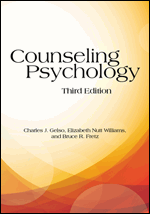Counseling Psychology is a third-edition textbook by Charles J. Gelso, Elizabeth Nutt Williams and Bruce R. Fretz that surveys the field of counseling psychology, emphasizing the blending of the rich traditions of research, clinical practice and theory for which the field is known. As the authors note in their preface, some have “confused counseling, the activity, with counseling psychology, the profession” (Gelso, Nutt Williams, & Fretz, 2014, p. xiii), essentially overlooking counseling psychology’s emphasis on an empirical psychology scientist–practitioner base, a broad range of activities, and unique training and career paths. The authors are prominent counseling psychologists themselves, and continue to elucidate how counseling is related to and part of the many professional activities present in the field of counseling psychology.
What is counseling psychology? Counseling psychology can be defined by the profession’s focus on the scientist–practitioner model, blending what we learn via research and applying it to clinical practice (and vice versa) and incorporating what we know about how people develop and change within their cultural and environmental frameworks. Central values include an emphasis on utilizing people’s strengths and helping them move toward optimal functioning, enhancing life-span development and vocational growth, advocating for social justice and cultivating multicultural awareness, incorporating brief preventive interventions when appropriate, and embracing a scientist–practitioner professional identity and set of skills. Counseling psychologists utilize these values in their work as psychotherapists, researchers, clinical supervisors, educators, consultants, administrators and so forth. Therefore, counseling psychologists are trained as counselors and psychotherapists as well as competent researchers, and their science-based skills and values can be used in myriad roles.
Counseling Psychology provides an overview of this professional field. Part I examines counseling psychology as a profession, focusing on its central values, ethics and history, and explaining how the field overlaps with other fields both within and apart from psychology. Part II expands on the empirical base of the field, with chapters that provide detail on topics such as research methods, vocational theory and research, diversity and social justice, positive psychology, and the process and outcome research that supports the work of counselors and psychotherapists. Part III provides thorough coverage of the practice of counseling psychology. The therapeutic relationship, psychological assessment, major theories of psychotherapy, career theories and interventions, and group and other systems theories and interventions are presented. Part IV provides readers with more information about how they may pursue a career in counseling psychology, with emphasis on graduate school training, job settings and work activities.
Counseling Psychology provides a balance of breadth and depth in the topics covered, successfully presenting readers with a wonderful overview of the field that is appropriately complex and sophisticated. Similar to its previous editions, it also is the only identifiable book written solely about the profession of counseling psychology, as opposed to the numerous books written about parts of the field (e.g., counseling, psychotherapy). These reasons likely contribute to why the text is on the required study reading list in some counseling psychology doctoral graduate programs in preparing doctoral candidates for their comprehensive examinations. The authors discuss multifaceted concepts, dynamics and professional challenges in a clear and concise yet thorough style. However, one weakness of the text is that it cannot provide the same amount of depth as a text that focuses on just one of these many areas (e.g., vocational psychology, research methodology, theories of counseling and psychotherapy). Clearly, a text on theories of counseling and psychotherapy can devote much more space and attention to such a topic.
In conclusion, Counseling Psychology is a highly recommended read. The book is suitable for undergraduate college students in upper level courses, counseling and counseling psychology graduate students, professionals in fields such as counseling and psychology, and anyone who desires to learn more about this rewarding, complex and important professional field.
Gelso, C. J., Williams, E. N., & Fretz, B. R. (2014). Counseling psychology (3rd ed.). Washington, DC: American Psychological Association.
Reviewed by: Courtney E. Gasser, NCC, University of Baltimore, Baltimore, MD.
The Professional Counselor
https://tpcwordpress.azurewebsites.net/

